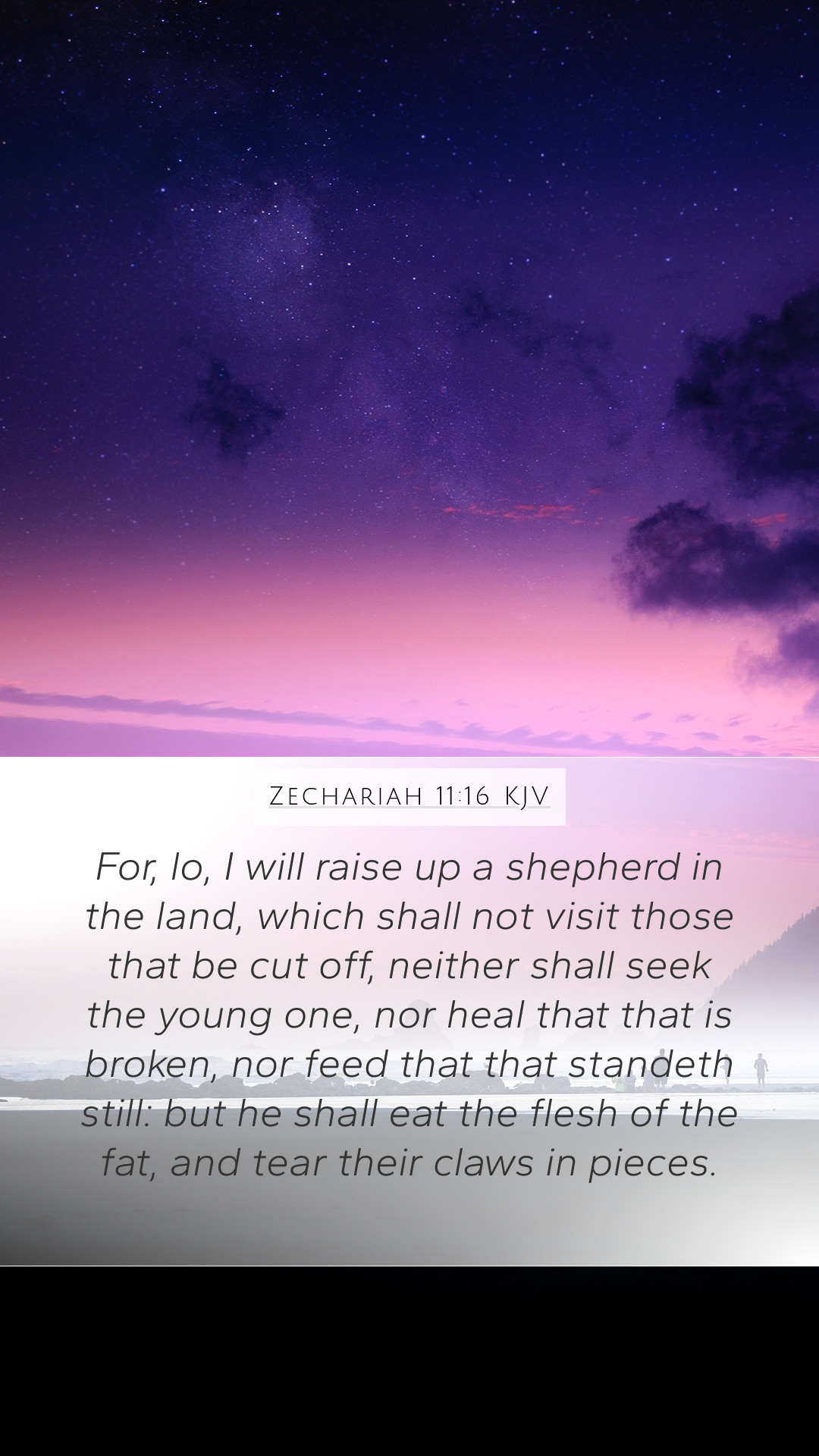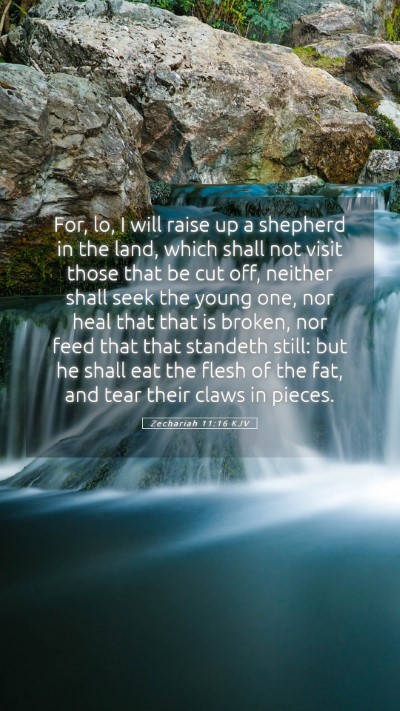Old Testament
Genesis Exodus Leviticus Numbers Deuteronomy Joshua Judges Ruth 1 Samuel 2 Samuel 1 Kings 2 Kings 1 Chronicles 2 Chronicles Ezra Nehemiah Esther Job Psalms Proverbs Ecclesiastes Song of Solomon Isaiah Jeremiah Lamentations Ezekiel Daniel Hosea Joel Amos Obadiah Jonah Micah Nahum Habakkuk Zephaniah Haggai Zechariah MalachiZechariah 11:16 Meaning
What is the meaning of Zechariah 11:16?
For, lo, I will raise up a shepherd in the land, which shall not visit those that be cut off, neither shall seek the young one, nor heal that that is broken, nor feed that that standeth still: but he shall eat the flesh of the fat, and tear their claws in pieces.
Zechariah 11:16 Bible Verse Meaning
Understanding Zechariah 11:16
In Zechariah 11:16, the Lord proclaims His intent to raise up a shepherd over His flock who will not care for the perishing, nor seek the young, nor heal the broken, nor feed the healthy. This verse speaks volumes about the consequences of rejecting God's guidance and the resultant leadership that is detrimental to the spiritual health of the people.
This verse stands as a prophetic warning that addresses the state of the nation of Israel, where the leadership has become ineffective at caring for the spiritual and physical needs of the people. It is a poignant reminder of the critical role that shepherds (leaders) play in the life of the church and the dire effects when they fail to fulfill their God-given responsibilities.
Commentary Insights
-
Matthew Henry's Commentary
Matthew Henry highlights the imagery of the bad shepherd who fails to fulfill the primary duties of care and guidance. He emphasizes that true shepherding encompasses concern for all aspects of the flock’s well-being, illustrating that neglect leads to a spiral of destruction and hopelessness.
-
Albert Barnes' Notes
Albert Barnes expounds on the metaphor of shepherds and the tragic outcomes of ineffective leadership. He points out that the absence of true understanding and compassion in leadership results in a flock that remains unprotected and uncared for, which symbolizes a wider abandonment of faith principles.
-
Adam Clarke's Commentary
Adam Clarke focuses on the prophetic implications of this verse, linking it to the eventual coming of Christ, the Good Shepherd. He contrasts the bad shepherd with the ultimate divine shepherd who embodies care, protection, and redemption, encouraging readers to look beyond earthly leaders to the divine leadership of Christ.
Thematic Elements
The themes present in Zechariah 11:16 can be explored further in light of:
- Leadership: The type of leaders God desires compared to those who serve for their own benefit.
- God's Judgment: The consequences of turning away from God's guidance.
- Hope and Restoration: The promise of a future leader who will genuinely care for His people.
Application and Reflection
Zechariah 11:16 calls for personal reflection on the nature of leadership within the church and individual lives. It raises critical questions:
- Are we valuing leaders who demonstrate selfless care and guidance?
- How can we, as individuals or communities, ensure that we are following shepherds who genuinely reflect God's heart?
- What steps can we take to embody the qualities of a good shepherd in our daily lives?
Cross References
This verse connects with various other Scripture passages that deepen its meaning:
- John 10:11: Jesus declares Himself the Good Shepherd who lays down His life for the sheep.
- Ezekiel 34:2-4: God rebukes the leaders of Israel for failing to tend to His flock.
- Matthew 9:36: Jesus, upon seeing the crowds, expresses compassion because they were like sheep without a shepherd.
Conclusion
In conclusion, Zechariah 11:16 serves as a profound reminder of the vital role of leadership in spiritual communities. Understanding this verse through various commentaries enriches our Bible study insights and equips us with the knowledge to interpret and apply these teachings in our lives. As we reflect on the nature and responsibilities of those in leadership, we are encouraged to seek after Christ, the ultimate Shepherd, who meets all our spiritual needs.


